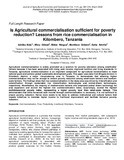| dc.contributor.author | Isinika, Aida | |
| dc.contributor.author | Mlay, Gilead | |
| dc.contributor.author | Mdoe, Ntengua | |
| dc.contributor.author | Boniface, Gideon | |
| dc.contributor.author | Saha, Amrita | |
| dc.coverage.spatial | Tanzania | en |
| dc.date.accessioned | 2022-04-07T10:00:33Z | |
| dc.date.available | 2022-04-07T10:00:33Z | |
| dc.date.issued | 2022-03-01 | |
| dc.identifier.citation | Aida, I.; Gilead, M.; Ntegua, M.; Gideon, B. and Amrita, S. (2022) Is Agricultural Commercialisation Sufficient for Poverty Reduction? Lessons from Rice Commercialisation in Kilombero, Tanzania, Journal of Agricultural Economics and Development. Vol. 11(1), pp. 001-015 | en |
| dc.identifier.issn | 2327-3151 | |
| dc.identifier.uri | https://opendocs.ids.ac.uk/opendocs/handle/20.500.12413/17291 | |
| dc.description.abstract | Agricultural commercialisation is widely promoted as a solution for poverty alleviation among smallholder farmers because it has been associated with rising cash income, improved nutrition and living standards. In Tanzania, agricultural commercialization is an important component for agricultural transformation to meet national goals and achieve global sustainable development goals. This paper uses data from Mngeta division in Kilombero district, a major rice-producing area in Tanzania, to demonstrate that attaining higher commercialisation may not be enough to ensure poverty reduction among small-scale farmers and medium-scale farmers. The findings show that rice commercialisation in the study area was driven by intensification and extensification through sustainable rice intensification technologies and animal-drawn technologies, respectively. Nonetheless, the majority of medium-scale farmers who employed animal drawn technology for area expansion and scored the highest rice commercialisation index, surprisingly, scored the highest multidimensional poverty index, representing a higher poverty level than small-scale farmers. This demonstrates that while increased cash income through commercialisation is necessary, it is not sufficient to ensure poverty reduction. Hence more needs to be done to address institutional and cultural factors that impede initiatives to translate higher income to livelihood improvement and facilitate inclusive poverty reduction. | en |
| dc.language.iso | en | en |
| dc.publisher | Journal of Agricultural Economics and Development | en |
| dc.rights.uri | http://creativecommons.org/licenses/by/4.0/ | en |
| dc.subject | Agriculture | en |
| dc.subject | Climate Change | en |
| dc.subject | Development Policy | en |
| dc.subject | Economic Development | en |
| dc.subject | Poverty | en |
| dc.subject | Rural Development | en |
| dc.title | Is Agricultural Commercialisation Sufficient for Poverty Reduction? Lessons from Rice Commercialisation in Kilombero, Tanzania | en |
| dc.type | Article | en |
| dc.rights.holder | ©2022 Academe Research Journals | en |
| dc.identifier.externaluri | http://academeresearchjournals.org/journal/jaed/archive/march-2022-vol.-11(1) | en |
| dc.identifier.team | Rural Futures | en |
| dcterms.dateAccepted | 2022-02-04 | |
| rioxxterms.funder | Department for International Development, UK Government | en |
| rioxxterms.identifier.project | APRA | en |
| rioxxterms.version | VoR | en |
| rioxxterms.funder.project | e1f6d3be-457a-4f13-8b1f-6748d1402d83 | en |


